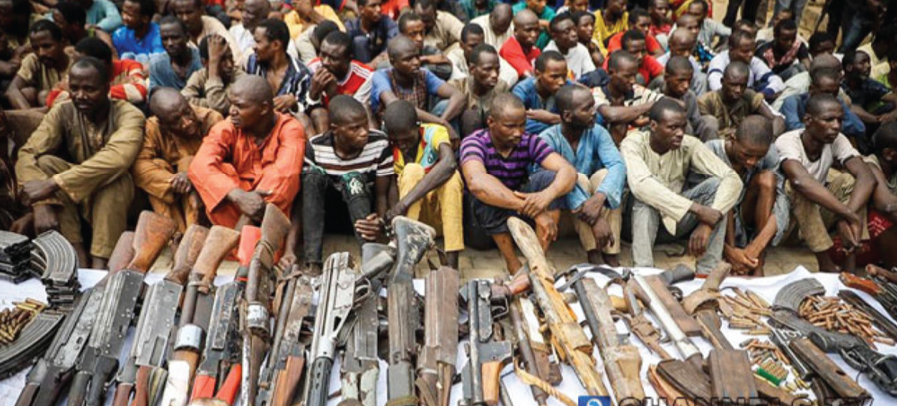By Our Correspondent
Palpable fears and anxiety have gripped Nigerians following increasing killings and kidnappings for ransom in parts of the country.
Findings by Citizenship Daily suggest that residents of the communities and towns where some notable personalities, including traditional rulers were abducted or killed recently are still petrified and unable to come to terms with what they described as “strange development.”
Some of the besieged communities by kidnappers and armed men include Koro in Kwara State, Bwari and Chikakorie in the FCT, among others.
Last week, the Olukoro of Koro in Kwara State, Segun Aremu, a retired general was killed in his Palace, and his wife and one other taken away by suspected kidnappers.
The police authorities said they have launched a manhunt for the killers of the monarch and abductors of his wife, even as Governor AbdulRahman AbdulRazaq has vowed that the killers would not go unpunished.
The cold blooded murder of Kwara monarch happened three days after gunmen shot down two monarchs and abducted10 school children and teachers in nearby Ekiti State. The abductors swiftly placed a N100 million ransom as condition for their freedom. Reports said the ransom was later reduced to N15 million.
The slain Ekiti traditional rulers were identified as the Elesun of Esun-Ekiti, David Ogunsakin and the Onimojo of Omojola-Ekiti, Olatunde Olusola, while the kidnapped pupils and teachers were said to be from Apostolic Faith School.

Miffed by the spate of killings and kidnappings, some 50 civil society groups had, at the wake of Ekiti incidents, demanded a state of emergency to deal with the menace. According to them, over 1,800 persons had been kidnapped since May 2023 when President Bola Tinubu was inaugurated. Some have, however, disagreed with the figure, insisting that no fewer than 400 persons have been abducted in less than one year.
The police authorities, however, disclosed last week that a total of 21 persons have been taken into their custody with respect to the Ekiti monarchs killing and school children’s abduction.
“Now, we have 13 suspects arrested so far in connection with that incident. And we are sure we are going to get more of these suspects,” Force Spokesman, Muyiwa Adejobi, disclosed on a Channels Television programme last week. That is in addition to the eight suspects earlier nabbed by the Ekiti State Police Command.
Earlier, in January, a highly reverred monarch was kidnapped in Imo State. The traditional ruler of Orodo Autonomous Community of Mbatoli Local Government Area, Eze Samuel Ohiri was seized from his residence by armed men. The monarch who was former Chairman of Imo Council of Traditional Rulers has since regained his freedom but has vehemently disagreed with the police on how his freedom was secured.
While the police said the monarch was rescued by their tactical command, Eze Ohiri faulted the claim, disclosing that he was released by his abductors after 12 days in their den, following payment of ransom in two instalments. He, however, did not disclosed the amount paid.
Payment of ransom to kidnappers is an offence in Nigeria but citizens seem to have no choice due to the lack of confidence that security agencies would act fast enough to rescue victims from their harrowing ordeal.
Eze Samuel would still count himself lucky to have had the opportunity to recount his ordeal. Some of his colleagues who had suffered the same fate of kidnapping weren’t so lucky-they were murdered.
For instance, on November 25, 2023, gunmen kidnapped the traditional ruler of Otulu Autonomous Community in Ezinihitte-Mbaise LGA, Eze Joe Achulor, in a similar manner Ohiri was taken away.
Achulor was killed on the same day and his corpse was dumped on Mbutu Road, a neighbouring community in Aboh-Mbaise.
Also, on July 17, 2023, the traditional ruler of Ezuhu Umuamadi Nguru Autonomous Community in Aboh Mbaise, Eze James Nnamdi (Mirioma), was also gruesomely murdered by yet-to-be-identified gunmen.
Imo State is generally notorious for kidnapping and similar criminal activities in recent times.
The abduction and killings in Kwara and Ekiti states happened just when the nation was pondering over how kidnappers were able to gain access to their victims in Abuja, Nigeria’s capital, despite the huge security presence.
About 19 abductees had been taken away by bandits from the Sagwari Estate Layout in the Dutsen-Alhaji area in the Bwari Area Council of the Federal Capital Territory earlier in January. They included six girls who were abducted from their home alongside their father, Alhaji Mansoor Al-Kadriyar.
One of the six sisters was killed by their kidnappers due to delays in meeting the demand for ransom. The gruesome murder sparked public outrage across the country.
In the outrage, some concerned Ngerians took the campaign to raise the ransom money to the social media in order to save the lives of the kidnapped sisters, a practice government had condemned as unwholesome and utter violation of the law that bans payment of ransom. Minister of Defence, Mohammed Badaru Abubakar said, besides the fact that ransom payment is outlawed, mass funding of ransom is giving greater impetus to the activities of kidnappers. He was answering questions from newsmen during the post Federal Executive Council press briefing penultimate week.
Two other girls and a senior government official were said to be kidnapped in Chikakorie in Kubwa, a surbub of the FCT in January with a demand for $25000 ransom.
Elsewhere in the northern part of the Nigeria, kidnappers had targeted students of both secondary and tertiary institutions for their nefarious activities.
In October last year, five students of Federal University, Dutsin-Ma, Katsina State and four students of Nasarawa State University, Keffi were kidnapped, while 24 students of Federal University, Gusau, Zamfara State were taken away by abductors in September.
Nigerians have expressed worry that despite more than a decade of fighting insecurity in the country, citizens still go to sleep with their eyes open due to increasing activities of bandits and kidnappers.








